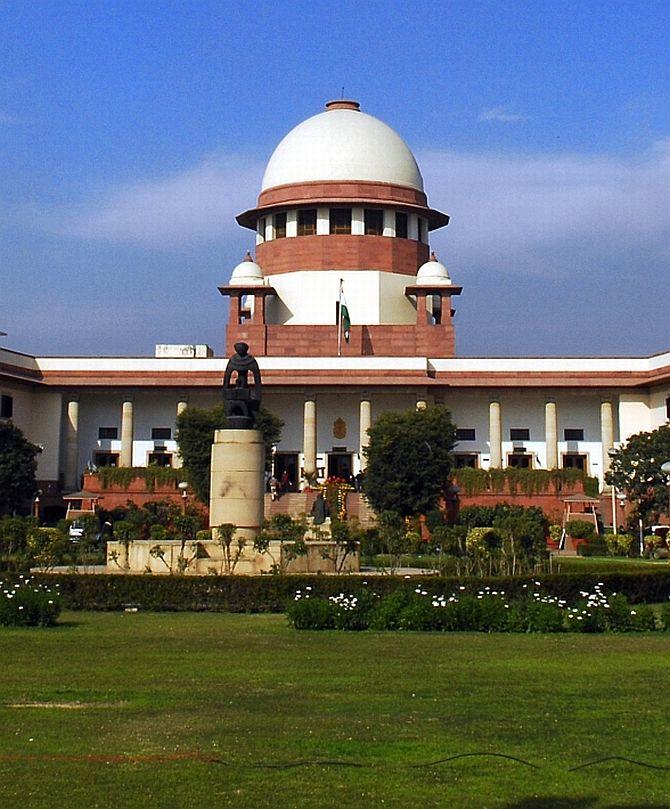Unless there is a solution that improves the present system of appointment of judges, it's best to not tinker with it, says Jayant Tripathi.

The other day when my car refused to start, I called my dentist -- an eminent dentist -- to fix it. He suggested I call the mechanic. This didn't seem quite right to me. Wouldn't a mechanic come with pre-conceived notions about what is wrong with my car? Should I let such a person, who is part of the car-repair process and therefore has a vested interest, take decisions about my car? I don't think so.
For a few moments, I had been brainwashed by self-appointed spokespersons of civil society into believing that the expert had no idea of how the system worked. And that is why I called the dentist to fix the car.
The current debate on the appointment of judges does not take into account a core issue -- the procedure for appointing judges to the high courts is not one where nepotism easily plays a role. In any case, certainly not in the manner that politics in our country appears to be nothing more than a family-run business.
In order to become a judge of a high court, a lawyer applies, providing all the important judgments in which he has appeared, along with other information. The application, after scrutiny and acceptance by the three senior-most judges of that high court, is forwarded to the Supreme Court. Three senior-most judges of the Supreme Court take a decision on suitability, and may also consult the two senior-most judges of the Supreme Court, who have served in the high court concerned. Reports from the Intelligence Bureau, the State Bar Council, the Income Tax authorities, etc are also obtained. So, while the judges consider professional capability and suitability, the IB report etc, look for aspects that render a person unsuitable. Only thereafter is a final decision made.
Do under-serving people sometimes manage to slip in? Probably they do, for no system is perfect. However, if a system largely works, it's best to leave it alone, unless there is a solution that will, with absolute certainty, improve the system.
To all the naysayers, who point to the enormous backlog of cases in India as a failing judicial system, I say just this: remember the judge who fainted in her court of exhaustion, because she was determined to finish all the 300 cases listed before her for the day? Three hundred cases? In one day? Three hundred files to be read, 600 lawyers to be heard, 300 judgments to be dictated. Certainly not a job that 'My Lord' is humanly capable of; it's more of a job for The Lord.
The issue that is truly of concern to the common man is not how judges are appointed, but how fast he or she can obtain redressal, which is a function of the number of judges available.
The high courts in India together have a sanctioned strength of about 750 judges, with about 400 vacancies. Bringing up the numbers to full strength would theoretically reduce pendency of cases in the high courts by half. An increase in the number of lower courts would also see a decline in the pendency of cases. Cases pending for decades might be finished in months. Shouldn't the energies of civil society be focused on achieving this?
I am aware this would entail expenditure of several thousands of crores, but to bring about a true rule of law, it is imperative that justice delivery times be reduced to a minimum to ensure swift and certain justice, the fear of which inherently acts as a deterrent.
The creation of judicial posts falls within the domain of the executive, where judges have no say. The executive decides whether the number of judges should be increased and how much funds to allot for the judicial infrastructure.
With one-third of parliamentarians having criminal cases against them, does it not serve the interests of some to delay trials for as long as possible? The simplest way to delay cases is to keep the number of judges to a minimum, where an overworked judge would be more than happy to grant an adjournment and move on to the next case.
In the entire debate no one has stated, with precision, as to what was wrong with the present system of selecting judges, and guarantee that any new proposed system will be better. For those who argue that the present system fosters nepotism, all I can say is if that is true, the introduction of eminent persons will only introduce more persons who need to be fixed, or whose nominees need to be included.
Eminent persons are all very well, but who decides eminence? And since when have judges ceased to be eminent members of civil society?
The political party of the day will invariably appoint a party sympathiser. Involving more than one political party in the selection process may result in trade-offs rooted in nepotism or lack of consensus, derailing the entire appointment process. If the eminent person has veto powers the entire process can be scuttled by the political party through its appointee. If not, then the eminent person is reduced to a cipher. What does this achieve?
The competence and suitability of a lawyer to be a potential judge is best adjudged by the judges before whom the lawyer appears day in and day out over a period of 20 years or more, and not by the dentist, politician, singer, actor, journalist or naval commandos, however eminent they might be.
Let's first identify the actual problems in the judicial system that the common man -- the real civil society -- faces and then come up with a solution, instead of creating a solution on the premise that the solution will solve all the problems.
In other words, if it ain't broke, don't fix it.
Jayant Tripathi is a practising lawyer.









